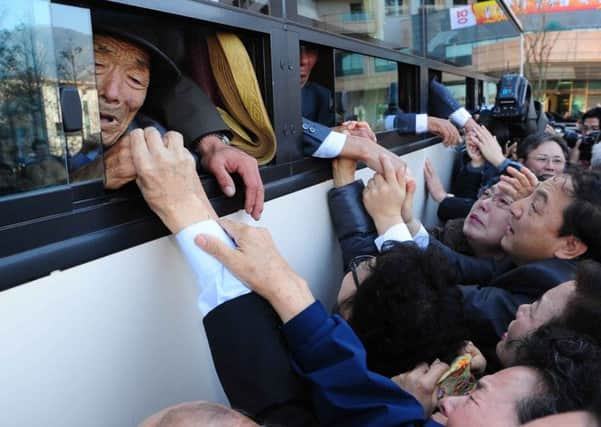Koreas agree to cross-border family reunions


It is another small step forward in easing tensions between the two countries despite North Korea’s anger over upcoming joint US and South Korean military drills.
Many in Seoul, the South Korean capital, had been sceptical that officials in the North would agree to a quick resumption of the dramatic reunions because of the annual military exercises later this month.
Advertisement
Hide AdAdvertisement
Hide AdNorth Korea calls them a rehearsal for invasion, and used last year’s drills to partly justify a torrent of threats and provocations that still clouds relations on the Korean Peninsula.
The North also scrapped an earlier plan for reunions at the last minute in September after accusing South Korea of planning war drills and other hostile acts.
It is again calling for the cancellation of the annual drills, but officials in Seoul and Washington insist they are purely defensive and have refused to call them off.
In a meeting of Red Cross delegates at a border village yesterday, North Korea agreed to hold the reunions between 20 and 25 February at its scenic Diamond Mountain, according to Seoul’s unification ministry, which is responsible for cross-border affairs.
North Korea’s official Korean Central News Agency also confirmed the arrangements yesterday.
During yesterday’s talks, South Korea expressed regret over the cancellation of the previous reunions, and North Korea agreed there should be no such recurrence, a ministry statement said.
Under the agreement, 100 elderly people from each country – chosen last September – will meet relatives, the statement said.
The talks were arranged after North Korea last month approved a resumption of the reunion programme, which has been stalled since late 2010.
Advertisement
Hide AdAdvertisement
Hide AdNorth Korea has recently softened its harsh rhetoric against South Korea and has made a series of conciliatory gestures in a sharp departure from a year ago, when it threatened Washington and Seoul with nuclear war and vowed to restart its production of fuel for nuclear weapons.
Analysts say impoverished North Korea needs improved ties with Seoul to help attract foreign investment and aid to improve living conditions and revive its sagging economy, and that it is unlikely to abruptly cancel this month’s reunions.
Analyst Hong Hyun-ik, from South Korea’s private Sejong Institute, said North Korea is also likely to ask South Korea to resume a lucrative joint tourism project at Diamond Mountain and provide fertiliser and other humanitarian assistance.
Mr Hong said the reunions are a symbolic move that could thaw tensions between the two Koreas, but relations could quickly sour again after the reunions end.
The Koreas share one of the world’s most heavily fortified borders and citizens are not allowed to exchange phone calls, letters or e-mails between the countries. The peninsula is still in a state of war because the 1950-53 Korean War ended with an armistice, not a peace treaty.
About 22,000 Koreans have had brief family reunions – 18,000 in person and the others by video – during periods of détente, but none has had a second chance to meet relatives.